calsfoundation@cals.org
Brooks Calbert Robinson Jr. (1937–2023)
Little Rock (Pulaski County) native Brooks Calbert Robinson Jr. made his debut as a major league baseball player with the Baltimore Orioles at the age of eighteen. By the time he retired as an active player after twenty-three seasons, Robinson was regarded by many as the best third baseman ever to play the game.
Brooks Robinson was born in Little Rock on May 18, 1937, to Brooks Calbert and Ethel Denker Robinson. A brother, Gary, was born five years later. His father, a fireman, had played semiprofessional baseball and in 1937 was a member of the International Harvester softball team from Little Rock that played in the finals of the World Softball Championship in Chicago.
Robinson began playing baseball at the grammar school level, as a catcher for the Woodruff School. He spent much of his time practicing at the facilities of the Arkansas School for the Deaf, which was across the street from his home. He also worked the scoreboard and sold cold drinks during minor league games played at Lamar Porter Field. While a student at Pulaski Heights Junior High, Robinson played quarterback for the 1951 junior high state championship football team and was an honorable mention on the all-state team.
Little Rock Senior High School, one of the major football schools in the state, did not field a baseball team in 1952 when Robinson enrolled there, so he played basketball and ran track to stay in shape for the American Legion baseball season. Robinson played baseball for the M. M. Eberts Post No. 1 Doughboys for four seasons, starting in 1951. In 1952 and 1953, Robinson’s team won the state American Legion baseball championships.
Following the conclusion of his American Legion career and his graduation from high school in 1955, several major league baseball teams were interested in signing Robinson. On Memorial Day in 1955, Robinson signed a contract with the Baltimore Orioles franchise, for which he played throughout his career.
Robinson began his professional career in the minor leagues, playing for the Baltimore farm team in York, Pennsylvania, in the Piedmont League. After hitting .331, he earned a promotion to the Orioles late in the season. Robinson moved between the major and minor league Baltimore teams over the next few seasons before becoming the Orioles’ regular third baseman for the 1958 season.
During the 1956 and 1957 seasons, Robinson was a teammate of fellow Arkansan and future Hall of Fame third baseman George Kell, who concluded his fifteen-year playing career with the Orioles in 1957.
From 1958 until late in his career, Robinson was the regular starting third baseman for the Orioles. Throughout his career, he was consistently one of the best fielders in baseball, and in 1960, he earned the first of sixteen straight Gold Glove awards as the top fielding third baseman in the American League.
Robinson’s hitting steadily improved, and in 1964, he was voted the Most Valuable Player in the American League. He finished the season with a .317 batting average, hit twenty-eight home runs, and led the league with 118 runs batted in.
In 1966, the Orioles added future Baseball Hall of Fame outfielder Frank Robinson to the team, and they began a period of dominance that resulted in the team’s appearing in the World Series four times in a six-year span. The Orioles won the 1966 World Series over the Los Angeles Dodgers in four straight games, with Brooks Robinson hitting a home run off Don Drysdale in his first time at bat.
After losing the 1969 World Series to the New York Mets, the Orioles returned in 1970 and defeated the Cincinnati Reds for their second championship. The 1970 World Series came to be known as “the Brooks Robinson Series” because he repeatedly made outstanding defensive plays and hit .429 with two home runs and six runs batted in during the five-game series. Robinson’s performance earned him the award for the Most Valuable Player of the World Series.
In 1971, Robinson played his last World Series with the Orioles, who lost to the Pittsburgh Pirates in seven games. The Orioles did win their division title again in both 1973 and 1974.
Robinson’s offensive production declined drastically after the 1974 season, and he retired as an active player on August 21, 1977. At the time of his retirement, Robinson held the all-time records for third basemen for number of seasons played (twenty-three), fielding percentage (.971), games (2,870), putouts (2,697), assists (6,205), and double plays (618).
In 1978, Robinson began a sixteen-season run as one of the Orioles’ television announcers. He was inducted to the Arkansas Sports Hall of Fame in 1978 and was elected to the Baseball Hall of Fame in 1983, his first year of eligibility. Robinson became one of only six former Orioles to have his uniform number (5) retired by the team.
In 2007, he was picked for the All-Time Rawlings Golden Glove Team. In 2011, a statue of Robinson was unveiled on Washington Boulevard in downtown Baltimore, and a statue of Robinson was dedicated in 2012 at Oriole Park at Camden Yards as part of the Orioles Legends Celebration Series.
Robinson married Constance Louise Butcher in 1960, and they had four children. He and his wife lived in Maryland. After Robinson retired from baseball, he began working for Crown Central Petroleum Corporation.
Later in life, Robinson suffered many health issues, including a prostate cancer diagnosis in 2009, a 2010 surgery that resulted in an infection, and a 2012 fall that left him hospitalized for a month.
Robinson died on September 26, 2023.
For additional information:
Brooks Robinson. http://www.brooksrobinson.com/ (accessed September 27, 2023).
National Baseball Hall of Fame: Brooks Robinson. http://baseballhall.org/hof/robinson-brooks (accessed September 27, 2023).
Pietrusza, David, Matthew Silverman, and Michael Gershman, eds. Baseball: The Biographical Encyclopedia. Toronto: Sport Classic Books, 2003.
Robinson, Brooks. Third Base Is My Home. Waco, TX: Word Books, 1974.
Wilson, Doug. Brooks: The Biography of Brooks Robinson. New York: Thomas Dunne Books, 2014.
Jeff Bailey
Arkansas State University
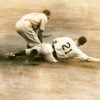 Baseball Players, Major League
Baseball Players, Major League Recreation and Sports
Recreation and Sports World War II through the Faubus Era, 1941 through 1967
World War II through the Faubus Era, 1941 through 1967 Brooks Robinson
Brooks Robinson 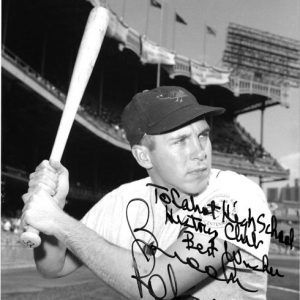 Brooks Robinson
Brooks Robinson 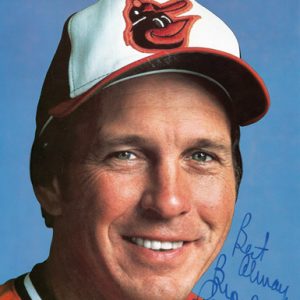 Brooks Robinson
Brooks Robinson 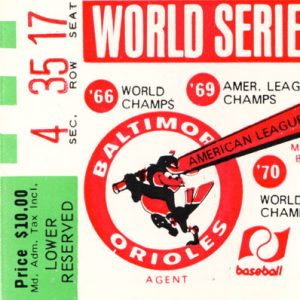 Ticket from World Series with Brooks Robinson
Ticket from World Series with Brooks Robinson 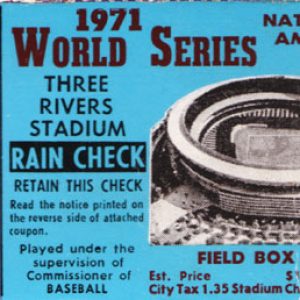 Ticket from World Series with Brooks Robinson
Ticket from World Series with Brooks Robinson 



Comments
No comments on this entry yet.